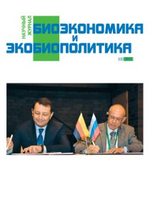Refinement of Liquid Agricultural Slurry or Digestate
Автор: Hans J. P. Freiherr V.
Рубрика: Тезисы
Опубликовано в Биоэкономика и экобиополитика №1 (1) декабрь 2015 г.
Дата публикации: 15.01.2016
Статья просмотрена: 6 раз
Библиографическое описание:
Hans, J P Freiherr V. Refinement of Liquid Agricultural Slurry or Digestate / J P Freiherr V Hans. — Текст : непосредственный // Биоэкономика и экобиополитика. — 2015. — № 1 (1). — URL: https://moluch.ru/th/7/archive/20/649/ (дата обращения: 26.04.2025).
“Waste does not exist, only wasted resources”
That is the vision and ethical basis of VAPORA, an international West- European technical consulting company in Germany and The Netherlands. We don´t develop and trade technology but analyze, evaluate existing or new methods or technical solutions and arrange them in a operating process chain.
Intensive livestock breading and importing fodder increase the problems of liquid “waste”. The main objective is to prevent over-fertilization and longtime consequences to agricultural soil.
Most important is to understand: what is the real situation of customers, on which resources they have access and which are the main problems with slurry, digestate or sewage sludge.
To prepare good decisions on customer’s side, we know and advise how to refine this “waste” into useable secondary products or renewable resources. That needs time to analyze and report his “reality” and his objectives and preselect technologies for economical solutions.
Working together with governmental organizations like Energy Agency North-Rhine-Westphalia (NRW) at the cluster for “biomass conversion and energy research” at Düsseldorf and the NRW-Ministry of Environment & Agriculture, early we get knowledge about new technologies and methods.
We evaluate those technologies, how to use and to shorten the “time to market”. We benchmark the potential of these technologies to be combined with other ones and how to be part of a complete process chain from “waste” to renewable resources.
An optimal solution in refining liquid “waste” is to extract the water content out of the contaminated liquor, to save organic minerals, destroy hormones and pharmaceutic elements and clean the water into environmental friendly osmotic water to be dumped in rivers. The dry solid content can be used as an energetic source to make offgrid heat and power.
There are 20 up to 30 different technologies to be implemented. But which combination will solve customer´s problems and what will come as close as possible to his economic intent?
So we are transmission belts between R&D- / production companies and customers need, but staying at customer´s side, which normally has no detailed knowledge or experiences of possible approaches. We have the focus on the total process chain and no reduced look on isolated modules. So we reduce the risks in decisions. Summary:
The VAPORA advisors analyze customers need /objectives, evaluate and arrange adequate technologies, how to separate liquid/dry content, to clean the water content of liquid “waste” from agriculture and/or municipal sewage, to recycle and refine the fertilization elements as ammonium, phosphate and potash to secondary products. The dry solid content can be used for energy production to feed burning, pyrolysis or steam installations.







